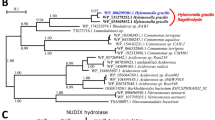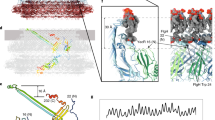Abstract
FLAGELLAR proteins (flagellins) from several species of bacteria have been studied by Weibull1 and, more recently, by Koffler2. The present investigations have revealed differences in the amino-acid compositions of the flagellins from Proteus vulgaris 2, and Salmonella typhimurium (Table 1). Also the latter protein has been found to contain ɛ-N-methyl-lysine, an amino-acid that has not been previously found to occur naturally.
This is a preview of subscription content, access via your institution
Access options
Subscribe to this journal
Receive 51 print issues and online access
$199.00 per year
only $3.90 per issue
Buy this article
- Purchase on Springer Link
- Instant access to full article PDF
Prices may be subject to local taxes which are calculated during checkout
Similar content being viewed by others
References
Weibull, C., Acta Chem. Scand., 5, 529 (1951); 7, 335 (1953).
Koffler, H., Bact. Revs., 21, 227 (1957). Rinker, N. J., Kobayashi, T., and Koffler, H., Fed. Proc., 16, 238 (1957).
Neuberger, A., and Sanger, F., Biochem. J., 38, 125 (1944).
Levy, A. L., and Chung, D., Anal. Chem., 25, 396 (1953).
Author information
Authors and Affiliations
Rights and permissions
About this article
Cite this article
AMBLER, R., REES, M. ɛ-N-Methyl-lysine in Bacterial Flagellar Protein. Nature 184, 56–57 (1959). https://doi.org/10.1038/184056b0
Issue Date:
DOI: https://doi.org/10.1038/184056b0
This article is cited by
-
Intestinal dual-specificity phosphatase 6 regulates the cold-induced gut microbiota remodeling to promote white adipose browning
npj Biofilms and Microbiomes (2024)
-
Epigenetic modification of m6A regulator proteins in cancer
Molecular Cancer (2023)
-
Post-translational modifications on the retinoblastoma protein
Journal of Biomedical Science (2022)
-
Epigenetics and beyond: targeting writers of protein lysine methylation to treat disease
Nature Reviews Drug Discovery (2021)
-
Methylation of Salmonella Typhimurium flagella promotes bacterial adhesion and host cell invasion
Nature Communications (2020)
Comments
By submitting a comment you agree to abide by our Terms and Community Guidelines. If you find something abusive or that does not comply with our terms or guidelines please flag it as inappropriate.



